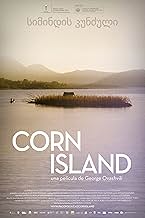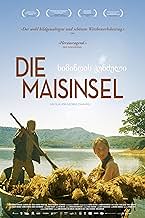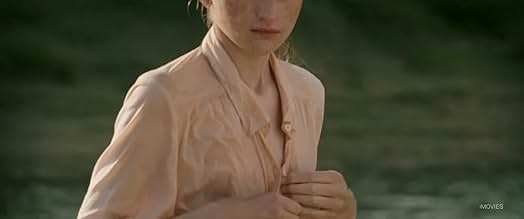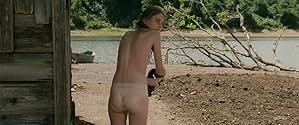Simindis kundzuli
- 2014
- 1h 40min
CALIFICACIÓN DE IMDb
7.4/10
4.8 k
TU CALIFICACIÓN
Agrega una trama en tu idiomaThe river creates and the river destroys in an eternal cycle that even man can't escape.The river creates and the river destroys in an eternal cycle that even man can't escape.The river creates and the river destroys in an eternal cycle that even man can't escape.
- Dirección
- Guionistas
- Elenco
- Premios
- 23 premios ganados y 12 nominaciones en total
- Dirección
- Guionistas
- Todo el elenco y el equipo
- Producción, taquilla y más en IMDbPro
Opiniones destacadas
As a review, I wouldn't go much into detail since the movie itself is minimal in most of the sense but if you are nature loving slow paced artistic movie fan, You will surely love this movie.
Although movie present post-war conflict between two nations, there's hardly any dynamics in visually or audibly.Simple story narration, An old man and his grand daughter find themselves in a small island temporarily formed by river and cultivate corn.
Director portray entire procedure in growing a corn plants which might feel a bit slow but the breezy tone of the cinematography makes the movie intellectually engaging This is a thought provoking beautifully executed art piece.
Although movie present post-war conflict between two nations, there's hardly any dynamics in visually or audibly.Simple story narration, An old man and his grand daughter find themselves in a small island temporarily formed by river and cultivate corn.
Director portray entire procedure in growing a corn plants which might feel a bit slow but the breezy tone of the cinematography makes the movie intellectually engaging This is a thought provoking beautifully executed art piece.
About cinema it is said that sometimes images convey perfectly what words fail to express. When words are uttered they make sense only when they merely suit the situations for which they were spoken. This effect is shown in Georgian film "Corn Island" with utmost austerity as an old man and his young grand-daughter set foot on a small island in the middle of a river. Their sudden arrival sets off a climate of distrust in the minds of other people. This is the start of a difficult life for them as there are also others who would like to see them defeated in their mission. There are some films which develop at their own pace. It is likely that laymen would call them slow whereas true admirers of cinema would label them as poetic works of art. Corn Island is one such film which would immensely appeal anybody who appreciates cinema as a poetic art. One can see how the entire process of planting a seed until the final stages of agriculture is carried out. The origin of this poetic film can be traced back to a day in August 1992 when an Abkhazian person ordered Georgian director George Ovashvili to leave Abkhazian black sea coast. According to him the war had started.
George Ovashvili's Corn Island is an auteuristic work that finds its balance between men and nature. Through the lives of an Abkhazian grandfather and his granddaughter, we find our place in the cycle of life. First you work the soil to feed yourself, then when you die you become part of the nature. This cycle reminds me of a Kim Ki-Duk film "Spring, Summer, Fall, Winter... and Spring" which is a brilliant film that attains nature from its characters' lives.
An Abkhazian peasant (Ilyas Salman) and his granddaughter (Mariam Buturishvili) are living on one of many islands created by Enguri River, the river stands as boundary between Abkhazia and Georgia. As they try to harvest enough corn to survive the winter, conflicts from outer world affects their lives. Girl finds a wounded soldier who have hidden himself in the corn plants. Old man and his granddaughter helps and hides him while his enemies searches for him. Conflict between two small groups of soldiers is an effective use of minimalism on clashes between Abkhazia and Georgia. But the film does not touch political issues, it takes the subject with an artistic point of view.
Old man has a lot of resemblances with titular character of Akira Kurosawa's "Dersu Uzala" as they both are living close to nature and away from "human". That made the watching interesting for me as I like Dersu Uzala and I think secluded characters are profound features of a film in terms of spirituality.
Generally I think director/co-screenwriter George Ovashvili take inspiration from directors Akira Kurosawa, Kim Ki-Duk and Jean Renoir (La Grande Illusion). Film has nearly no dialogue yet the cinematography of the film by Elemér Ragályi seemed like it was talking with images, I think Ragályi has a style close to Emmanuel Lubezki and Christian Berger.
It is not a masterpiece but this slow-burning film has a somber beauty, art-house fans will like it.
An Abkhazian peasant (Ilyas Salman) and his granddaughter (Mariam Buturishvili) are living on one of many islands created by Enguri River, the river stands as boundary between Abkhazia and Georgia. As they try to harvest enough corn to survive the winter, conflicts from outer world affects their lives. Girl finds a wounded soldier who have hidden himself in the corn plants. Old man and his granddaughter helps and hides him while his enemies searches for him. Conflict between two small groups of soldiers is an effective use of minimalism on clashes between Abkhazia and Georgia. But the film does not touch political issues, it takes the subject with an artistic point of view.
Old man has a lot of resemblances with titular character of Akira Kurosawa's "Dersu Uzala" as they both are living close to nature and away from "human". That made the watching interesting for me as I like Dersu Uzala and I think secluded characters are profound features of a film in terms of spirituality.
Generally I think director/co-screenwriter George Ovashvili take inspiration from directors Akira Kurosawa, Kim Ki-Duk and Jean Renoir (La Grande Illusion). Film has nearly no dialogue yet the cinematography of the film by Elemér Ragályi seemed like it was talking with images, I think Ragályi has a style close to Emmanuel Lubezki and Christian Berger.
It is not a masterpiece but this slow-burning film has a somber beauty, art-house fans will like it.
I actually stumbled upon this film by accident. In my search for all things horror, I came across "Corn Island" somewhere. Maybe there is another "Corn Island" movie lurking about, but this definitely wasn't it. About 15 or 20 minutes in, when I realized that this wasn't horror, I kept it playing anyway because it did seem interesting.
Really, it was almost a silent feature as the characters didn't speak much. What intrigued me was the Georgian setting, the picturesque cinematography, the backdrop of war, and the whole idea about planting corn on an island year after year. Acting all around was good, too.
When I was younger I spent a lot of time watching foreign language dramas from France, Russia, Turkey, Japan, Belgium, Germany, the Netherlands and other places. I think it's time to give films from Georgia my full attention, too, since they seem to rate so high right here on IMDb.
Really, it was almost a silent feature as the characters didn't speak much. What intrigued me was the Georgian setting, the picturesque cinematography, the backdrop of war, and the whole idea about planting corn on an island year after year. Acting all around was good, too.
When I was younger I spent a lot of time watching foreign language dramas from France, Russia, Turkey, Japan, Belgium, Germany, the Netherlands and other places. I think it's time to give films from Georgia my full attention, too, since they seem to rate so high right here on IMDb.
"Corn island" is about islands that run dry in early spring and are swallowed up by the river again during winter. In the meantime it is very fertile land and farmers from the neigbourhood are keen to occupy such an island in order to sow and harvest corn.
From the above description it is clear that "Corn island" is a slow movie about a slow and peaceful live. You can nearly see the corn crow. This slow and peaceful live however is disrupted in multiple ways.
In the first place is the corn island of this movie situated in a disputed territory between two countries. Rival soldiers are regularly passing by the island. The farmer is determined to stay out of this war. Will he succeed? This aspect of the film reminded me of the Dutch novel "The house of refuge" (1952, Willem Frederik Hermans).
A farmers live is always governed by the seasons, but that is especially true if your field is on a temporary island. The second cause of disruption.
Not only the corn is growing, but also the granddaughter of the farmer. This fact does not pass unnoticed by the passing soldiers, forming the third disruptive force. This third aspect of the film is in my opinion the weakest. The coming of age is portrayed using a lot of clichés such as suddenly being tired of your favorite doll or experiencing the first menstrual cycle.
After "In bloom" (2013, Nana Ekvtimishvili) "Corn island" was the second film from Georgia I saw within a year. Remarkable was the large share that the grandparents had in both films in raising their grandchildren. A coincidence?
From the above description it is clear that "Corn island" is a slow movie about a slow and peaceful live. You can nearly see the corn crow. This slow and peaceful live however is disrupted in multiple ways.
In the first place is the corn island of this movie situated in a disputed territory between two countries. Rival soldiers are regularly passing by the island. The farmer is determined to stay out of this war. Will he succeed? This aspect of the film reminded me of the Dutch novel "The house of refuge" (1952, Willem Frederik Hermans).
A farmers live is always governed by the seasons, but that is especially true if your field is on a temporary island. The second cause of disruption.
Not only the corn is growing, but also the granddaughter of the farmer. This fact does not pass unnoticed by the passing soldiers, forming the third disruptive force. This third aspect of the film is in my opinion the weakest. The coming of age is portrayed using a lot of clichés such as suddenly being tired of your favorite doll or experiencing the first menstrual cycle.
After "In bloom" (2013, Nana Ekvtimishvili) "Corn island" was the second film from Georgia I saw within a year. Remarkable was the large share that the grandparents had in both films in raising their grandchildren. A coincidence?
¿Sabías que…?
- TriviaIn order to find the location for this movie, the filmmakers had been looking for a real island for two years. Eventually, they realised it would be too complicated and too dangerous to film on such a place. Instead, they built the island on an artificial lake, where they could control the water level to some extent, director George Ovashvili revealed in an interview.
- ConexionesReferenced in CT na MFF Karlovy Vary 2017: Generální reditel Petr Dvorák (2017)
Selecciones populares
Inicia sesión para calificar y agrega a la lista de videos para obtener recomendaciones personalizadas
- How long is Corn Island?Con tecnología de Alexa
Detalles
- Fecha de lanzamiento
- Países de origen
- Sitio oficial
- Idiomas
- También se conoce como
- Corn Island
- Locaciones de filmación
- Productoras
- Ver más créditos de la compañía en IMDbPro
Taquilla
- Presupuesto
- EUR 1,500,000 (estimado)
- Total a nivel mundial
- USD 37,445
Contribuir a esta página
Sugiere una edición o agrega el contenido que falta






















